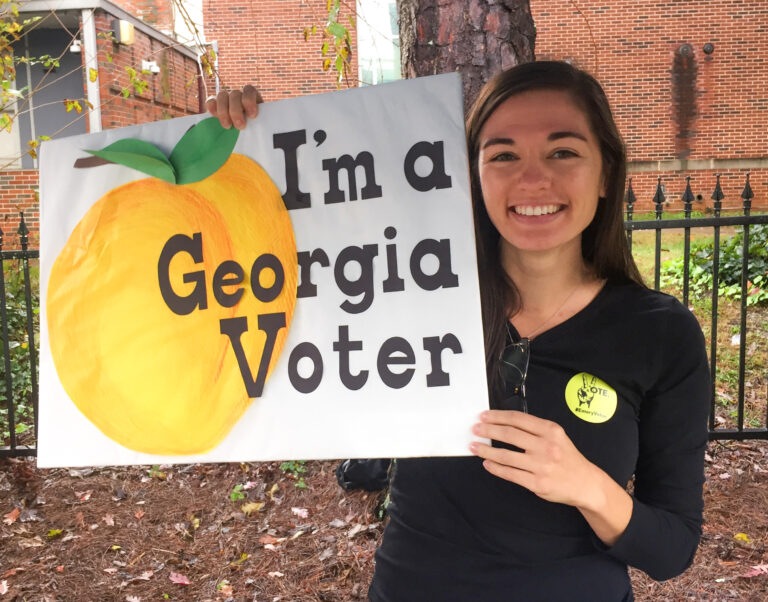
ESAL is excited to welcome Taylor Spicer on board as our first managing director. We sat down with her to learn a bit about her background and new role.
CS: How did you first get involved in issues that relate to science and technology?
Spicer: My mother, who is an avid and gifted gardener, raised me in Memphis, Tennessee and cultivated in me an early appreciation for the natural sciences and human-nonhuman species relationships. After high school, I left Memphis to pursue a social sciences degree in cultural anthropology and international relations at the University of Arkansas. My thesis research focused on the political culture of Brazil and its impact on social movements in the state of Bahia. This work led me to pursue an international development master’s degree, through which I continued to explore the interplay of social, political, and environmental forces within local communities.
While studying, I interned with an administrative office working across Emory University and Emory Healthcare – the Office of Sustainability Initiatives. After graduation, I accepted a full-time offer with this team and spent the next seven and a half years learning to craft institutional strategies, policies, processes, and programs that aimed to make the sustainable and just choices the default choices by employing best practices in buildings sciences, land management, energy, local food procurement, climate solutions, water reclamation technology, waste management, and more.
CS: People often think of many of the challenges we face - such as climate change - as national issues. What is the importance of local engagement?
Spicer: Many challenges we face are national and global in scale but are experienced in localities. Resiliency, preparedness, mutual aid, infrastructure, social services, protections for civil and human rights, and much more are determined by local governments, organizations, and networks of engaged community members. Local action is required to provide people and nonhuman species the capacity to thrive in all localities despite pervasive collective challenges, such as climate change. In the U.S., our opportunities and wellbeing are affected by the places we live because communities reflect historical and current disparities and differing governmental values, budgeting, regulations, and support services.
CS: What role do you see for ESAL in supporting engagement at the local and state level?
Spicer: ESAL is building the collective will and capacity of STEM professionals across the country to find the most effective ways of positively influencing their local communities. ESAL is showcasing locally-engaged professionals, hosting conversations to raise awareness about opportunities for local engagement, and providing professionals with the tools to become active residents through tailored workshops and events. ESAL is uniquely filling these civic engagement gaps.
ESAL is also part of a larger evolution of the roles STEM professionals play in society. Typically, civic engagement training is not integrated into academic and professional credentialing in STEM fields; however, the specialized experiences and knowledge STEM professionals embody sets them up to be assets to their communities when they are engaging in civic processes and organizations. One of ESAL’s strengths is showing the myriad ways STEM professionals do and can contribute to local communities.
CS: What will you be doing in your new position at ESAL?
Spicer: As the managing director, I will focus mostly on strengthening ESAL’s internal capacity to allow ESAL volunteers to have a meaningful and productive experience in the network. I’ll provide organizational management to streamline processes and to better connect work done across the organization, as well as operational support for keeping records, managing finances, and coordinating logistics. I’ll implement enhancements to the volunteer recruitment, onboarding, management, and engagement strategies utilized to set all ESAL volunteers up for success. Throughout all of this work, I’ll ensure ESAL’s Justice, Equity, Diversity, and Inclusion commitments are central, employed, evaluated, and adapted as needed.
CS: What ideas do you have to strengthen or grow ESAL's programs?
Spicer: I see opportunities to formalize some of the internal processes to bring more ease to the ESAL volunteer experience, which I think will translate to more consistent and quality content and programming shared with the ESAL network. I am exploring ideas for growing the network overall and expanding opportunities for engagement with ESAL. I am especially energized to connect my sustainability and Southeastern networks to ESAL’s work. I am also exploring ways ESAL can help STEM professionals fill research and knowledge needs defined by local governments and community-based groups.
CS: What advice do you have for someone who has a STEM background for getting engaged at the local level?
Spicer: For anyone looking to get involved locally for the first time, I suggest three main approaches. First, I suggest getting plugged into conversations that are already happening in your community. You can do this by following communications from your local governments, issue-based and advocacy nonprofits, community-based organizations, neighborhood associations, and your local representatives. You are joining a group of already activated residents who have been a part of shaping the work to-date and who most likely understand the history behind and nuances of a topical issue or proposed legislation. You can learn much about local engagement by following calls to action from others. Second, I suggest trying to narrow your focus to an issue or level of governance that is most closely aligned with your work or interest. The opportunities for engagement can feel endless, so narrowing your focus can make the first step into engagement more manageable. Third, I suggest being realistic about the time you have to share. You gain credibility and experience by showing up consistently. If you dive into too many opportunities too quickly or overcommit, you risk burnout, which is detrimental to your ability to engage locally for the long-term. One-off engagements can change an outcome, but developing a lifestyle of community engagement can lead to more connectivity to people and place, mutual understanding, personal agency, and hopefully healthier and happier communities overall.